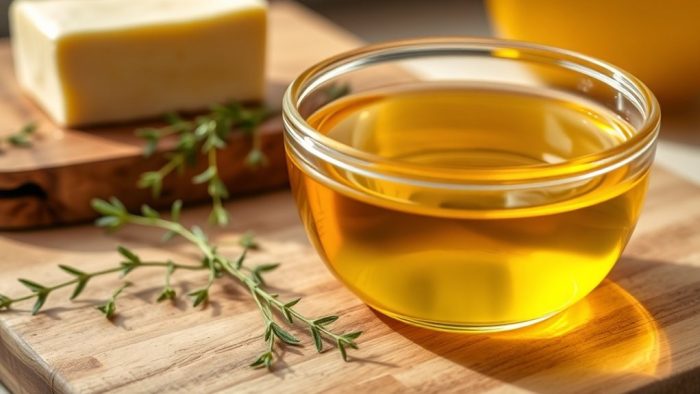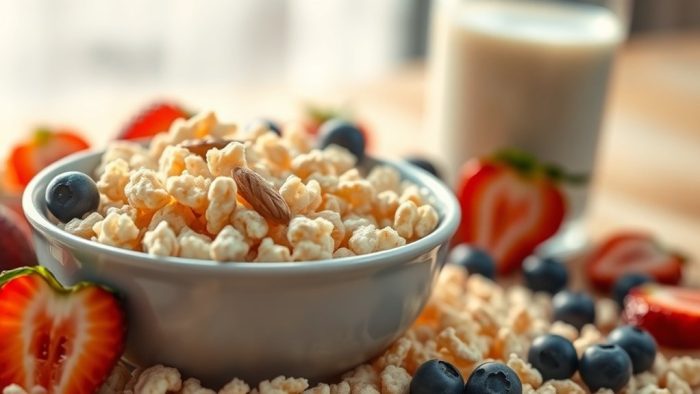Is Boba Tea Vegan

Boba tea isn’t automatically vegan, but you can easily make it plant-based with the right choices. Traditional tapioca pearls are typically vegan since they’re made from tapioca starch, but you’ll need to avoid dairy milk by requesting alternatives like oat, soy, or almond milk. Watch out for honey-sweetened pearls, caramel additives, and non-vegan toppings like egg pudding. Always verify ingredients with your server, as formulations vary between shops. Understanding which specific components to customize will help you enjoy a completely vegan boba experience.
Understanding Boba Tea and Its Vegan Status
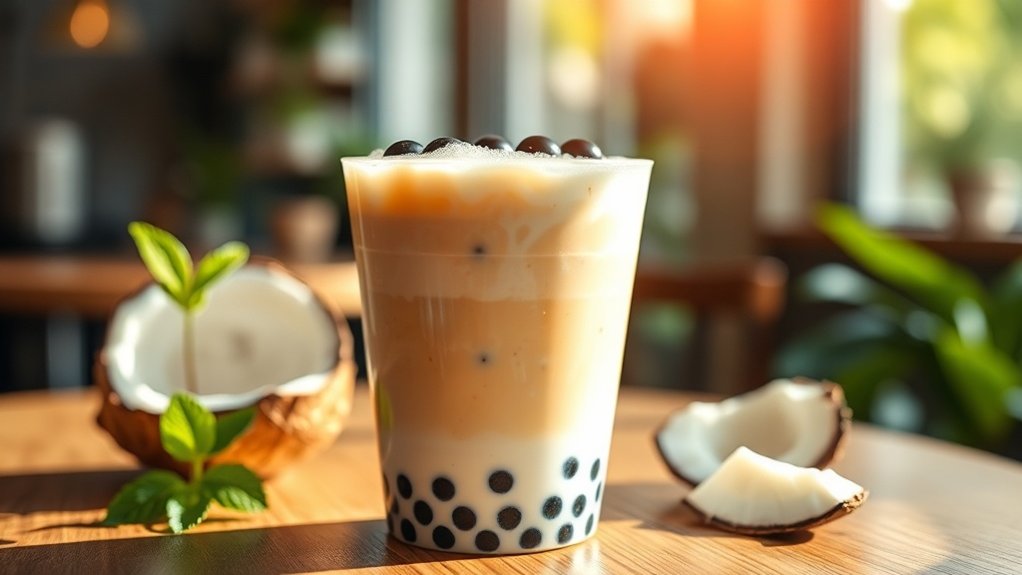
How can you determine if your favorite boba tea aligns with vegan dietary principles? Understanding boba tea’s vegan status requires examining each component carefully.
Traditional tapioca pearls are typically plant-based, derived from tapioca starch, making them inherently vegan-friendly. However, you’ll need to verify that no honey or caramel sweetener has been added during preparation.
The primary concern involves dairy milk commonly used in standard recipes. Fortunately, most establishments now offer plant-based milk alternatives like almond or oat milk.
You should also investigate vegan toppings such as coconut gel and fruit jellies, which provide excellent non-dairy options. Always confirm ingredients with your server, as formulations vary between shops.
Breaking Down Boba Tea Components: What’s Vegan and What’s Not
When ordering boba tea, you’ll encounter three main components that determine its vegan status: the tea base, the pearls or toppings, and any sweeteners or flavorings.
The Pearls: Tapioca pearls are typically vegan-friendly, containing tapioca starch, water, and sugar. However, you’ll need to verify that non-vegan ingredients like honey or caramel aren’t added.
The Base: Traditional vegan boba milk tea becomes problematic when dairy milk is used. Request non-dairy alternatives like soy, oat, or almond milk.
Fruit-based options naturally avoid this issue.
Toppings: While fruit jellies and coconut gel are vegan-friendly choices, avoid egg pudding.
Most tea shops now clearly label their ingredients, making it easier to identify non-vegan ingredients and customize your order accordingly for a completely plant-based beverage.
How to Order Vegan Boba Tea at Popular Chains
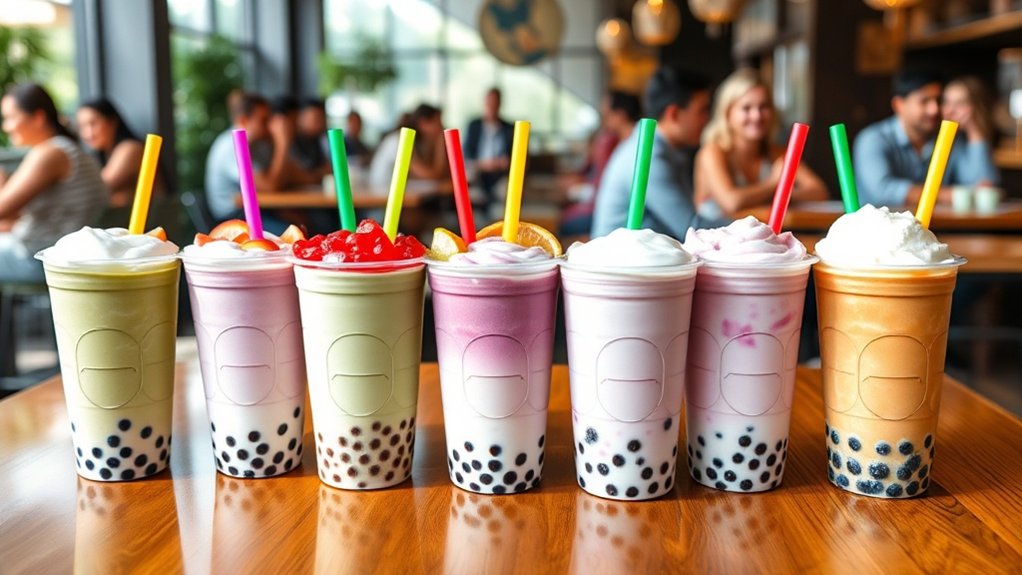
While ordering vegan boba tea once required extensive ingredient interrogation, many popular chains now simplify the process with clearly marked plant-based options and willing staff.
At Boba Guys, request cassava-based tapioca pearls and avoid honey as a sweetener, grass jelly, and egg pudding.
Sunright Tea Studio accommodates customization through vegan milk substitutions like almond or oat options for milk teas, while their fruit tea selections remain naturally plant-based.
Magik Milk guarantees thorough vegan compatibility across their entire menu.
Shaboba specializes exclusively in vegan offerings, featuring oat milk tea varieties with add-ins like lychee and aloe jelly.
Nova Boba serves verified vegan drinks at plant-based events.
When visiting boba shops, clearly communicate your dietary preferences and confirm which toppings and sweeteners align with vegan standards to make sure your beverage meets your requirements.
Common Non-Vegan Ingredients to Watch Out For
Although boba tea appears deceptively simple, several ingredients commonly lurking in these beverages can compromise their vegan status. Understanding these non-vegan components helps you make informed choices when ordering.
Key non-vegan ingredients to identify:
- Dairy milk – Traditional boba milk teas use cow’s milk unless you specifically request plant-based alternatives.
- Honey and caramel – Golden and white boba pearls frequently contain these animal-derived sweeteners.
- Egg pudding – This popular topping directly conflicts with vegan-friendly standards due to its egg content.
- Hidden animal products – Some flavorings and seemingly innocent toppings like fruit jellies may contain dairy or other animal-derived ingredients.
Always verify specific ingredients with your server before ordering.
Even vegan-appearing toppings and boba pearls warrant scrutiny to confirm they’re genuinely plant-based.
Vegan-Friendly Milk Alternatives and Toppings Guide
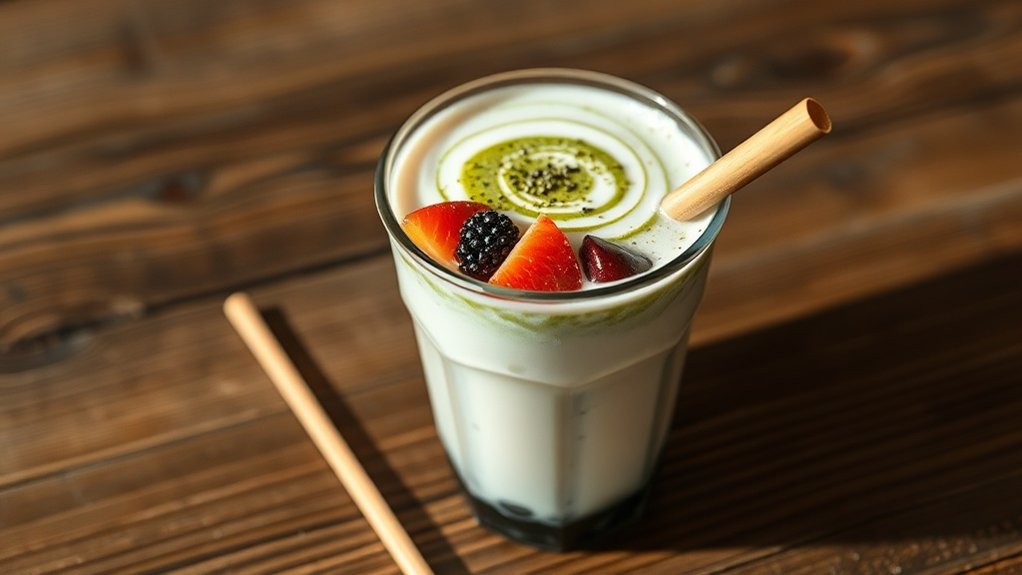
You’ll find several plant-based milk alternatives that work well in boba tea, including almond, oat, soy, and coconut milk—each offering distinct nutritional profiles with varying protein, fat, and micronutrient content.
When selecting toppings, you can choose from vegan-friendly options like tapioca pearls, fruit jellies, and grass jelly, though you’ll need to verify that egg pudding and certain sweeteners haven’t been added.
Pay particular attention to sweetener sources, as some boba shops use honey instead of vegan alternatives like agave nectar or simple syrup made from cane sugar.
Non-Dairy Milk Options
Because plant-based milk alternatives have become increasingly accessible, you can now enjoy boba tea without compromising your vegan lifestyle.
When ordering, you’ll find multiple non-dairy milk options that create satisfying, vegan-friendly beverages.
Available plant-based milk alternatives include:
- Oat milk – Delivers exceptional creaminess and naturally complements tea flavors
- Soy milk – Provides protein-rich nutrition with a smooth consistency
- Almond milk – Offers a lighter, subtly nutty profile
- Coconut milk – Creates tropical richness with natural sweetness
Always specify your preferred non-dairy milk when ordering to guarantee complete vegan compliance.
Improve your drink with plant-based toppings like lychee jelly, grass jelly, or coconut gel.
However, you must verify ingredients with staff, as some shops use honey or egg-based pudding that compromises vegan standards.
Vegan Boba Toppings
Selecting the right toppings completes your vegan boba experience and adds textural variety to your drink. Traditional tapioca pearls are typically plant-based, made from cassava starch, though you’ll want to verify they’re not sweetened with honey.
Popping boba provides an exciting burst of fruit syrup and is generally vegan, crafted from seaweed extract and juice. Jelly toppings like lychee, rainbow, and coconut gel offer chewy textures without animal products. Sweet bean paste serves as another plant-based option that adds subtle sweetness.
However, you must avoid certain toppings. Egg pudding and honey-sweetened varieties aren’t vegan.
Fortunately, many establishments now clearly label their plant-based selections, making it easier to customize your drink confidently. Always ask staff about ingredient sourcing to guarantee your complete boba creation aligns with vegan standards.
Sweetener Considerations
While sweeteners improve boba tea’s flavor profile, their sources determine whether your drink remains vegan-compliant.
You’ll need to verify ingredients carefully when ordering, as common non-vegan sweeteners can compromise an otherwise plant-based beverage.
Non-vegan sweeteners to avoid:
- Honey – derived from bees and not considered vegan
- Sweetened condensed milk – contains dairy and often serves as both sweetener and creamer
- Caramel syrups – may contain butter or cream
- Brown sugar syrups – occasionally processed with bone char
When you customize your order, request standard white sugar or agave syrup as vegan alternatives.
Always confirm with staff that your chosen sweetener contains no dairy or animal-derived ingredients.
Since sweeteners interact with both your milk base and toppings, maintaining vegan standards throughout guarantees your complete boba experience aligns with plant-based principles.
Making Your Own Vegan Boba Tea at Home
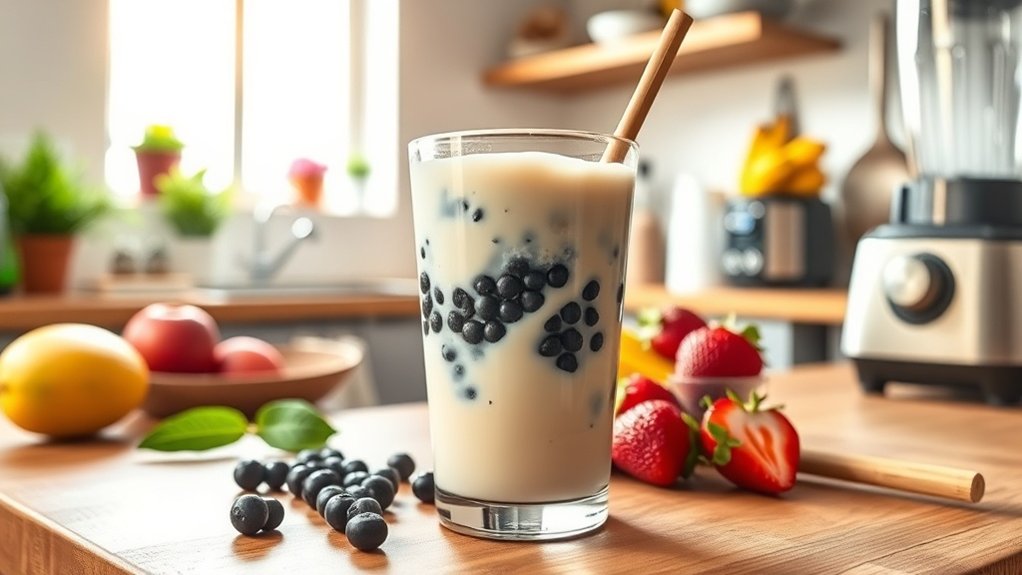
Creating your own vegan boba tea at home gives you complete control over ingredients while confirming the drink aligns with plant-based dietary principles.
You’ll need 1/2 cup dry tapioca balls, which you’ll cook in boiling water for 5-8 minutes until transparent, stirring to prevent sticking.
Brew strong tea using two black tea bags, then refrigerate for a revitalizing base.
Prepare sugar syrup using two tablespoons of liquid sweetener mixed with your cooled bubble tea.
Assemble by combining cooked tapioca balls with the brewed tea, then add two cups of vegan milk for desired creaminess.
For best texture and flavor, consume immediately after cooking.
Serve with a reusable metal straw for an eco-conscious approach to enjoying this plant-based beverage.



